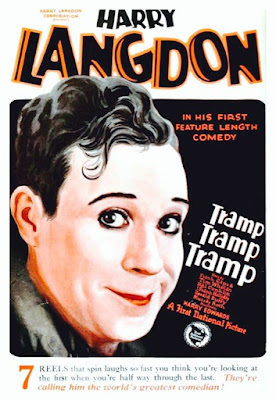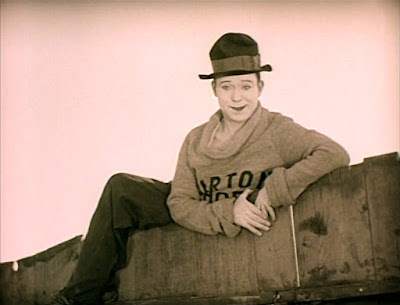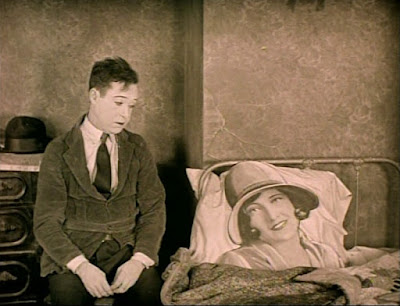(1926) Directed by: Harry Edwards; Written by: Frank Capra, Tim Whelan, Hal Conklin, J. Frank Holliday, Gerald C. Duffy and Murray Roth; Starring: Harry Langdon, Joan Crawford, Edwards Davis, Tom Murray and Alec B. Francis; Available on DVD (included on Harry Langdon… The Forgotten Clown)
Rating: ***
“Systematic absentmindedness is the most comical thing
imaginable …the four greatest stimuli to laughter are rigidity, automatism, absentmindedness,
and unsociability.” – Harry Langdon (excerpted from the article “The Case for
Harry Langdon: How and Why Frank Capra Was Wrong,” by Ben Urish, Journal of Popular Culture)
Harry Langdon was one of the biggest silent comedians of his
day, but unlike Chaplin, Keaton or Lloyd, time hasn’t been kind to his legacy. Although
he briefly enjoyed success that equaled or surpassed his comic contemporaries,
he’s not nearly as well-known, nor regarded as favorably today. Outside of film
historians and some ardent silent movie fans, Landon never enjoyed a post-mortem
resurgence of popularity. Why did some other silent comics endure, and why did
Langdon become a footnote? First of all, Langdon was a latecomer to the big
screen, making his first short at age 40, so his body of work wasn’t quite as
robust. Also, his brand of comedy, with his signature man-child character,
doesn’t seem to have aged nearly as well. In the mid ‘20s, however, he could apparently
do no wrong, establishing himself in more than 20 shorts, and making his
feature film debut with Tramp, Tramp,
Tramp.
Amos Logan (Alec B. Francis) is finding it hard to compete, with his 40-year-old homegrown shoe business. With few orders and rent overdue, he may have to close shop for good. Meanwhile, sales are booming for nearby rival, Burton Shoes. Its president and founder, John Burton (Edwards Davis) decides to host a cross-country walking competition, promising a $25,000 cash prize to the winner.* Amos’ son Harry (Harry Landon), considers this an opportunity to save his father’s business. He inadvertently creates an archrival in champion walker (and his father’s landlord) Nick Kargas (Tom Murray). Kargas’ animosity towards Harry is only exacerbated when circumstances force them to share a hotel room.** The odds seem hopelessly against Harry’s favor, but he finds additional motivation in the president’s daughter, Betty Burton (Joan Crawford), who adorns the shoe company’s advertisements. It would be a gross understatement to mention that he’s absolutely smitten by her (“I’m so crazy about that girl, I’m crazy.”). If the internet existed back then, Harry likely would have set up a fan account in her honor. Alas, he resigns himself to pilfering cutouts of her face from billboards.
* Fun Fact: According to the Bureau of Labor Statistics inflation calculator, this would be equivalent to $393,056.03 in today’s dollars.
** In a joke that (rightfully) wouldn’t pass muster today,
Kargas gives him a combination of sleeping pills and alcohol to get him to
sleep.
Harry embarks on his cross-country trek, peppered with a
series of misadventures. In one of the film’s best gags, he straddles a fence, situated
precariously over a sheer cliff face, oblivious to the dizzying heights below. Thanks
to his charmed existence, he turns a potentially life-threatening situation
into a boon. His luck temporarily runs out when he winds up on a chain gang,
but he can’t be contained for long. The film’s climax saves the most elaborate
gags (featuring collapsing buildings) for last, with Harry battling a deadly
cyclone. Will Harry prevail against the elements, win the race, and get the girl?
My virtual lips are sealed.
According to his nephew (also named Harry Langdon), “Our
laughter at Harry’s characters is largely on the basis of their naivete and
failure to even know that they have a problem” (excerpted from “Film Comedian –
The Adult Child,” from Literature Film
Quarterly). Herein lies the key to understanding Langdon’s comedy. Landon’s
man-child character exists in a constant state of befuddlement, leaving chaos
in his wake. A similar character was adopted by Paul Reubens, many years later,
as Pee-wee Herman. On the surface, Reubens’ creation seems to be a direct descendent,
if not for one significant difference. Although he’s essentially a child in a
man’s body, Pee-Wee Herman possesses a sort of relatable, world-weary savvy,
able to engage the rest of the world on his terms using wit and ingenuity. On
the other hand, Langdon’s character is comparatively one-note, retaining his
innocent, childlike (some might say childish) outlook – his personal triumphs
are largely the result of dumb luck. As a result, Langdon’s schtick doesn’t resonate
at the same level. His character will likely induce a polarizing effect, which
you’ll either find oddly endearing, or it will grate on your nerves.
A good comedy film should have, among other things, more gags that land instead of flop. Tramp, Tramp, Tramp is no exception. Distilled to its essentials, the film isn’t much more than a string of gags orbiting a simple plot. Considering the fact that at least half a dozen people contributed to the script, it’s unsurprising that (even at 62 minutes), the movie meanders, with some scenes dragging on too long, while others seem shoehorned into the story. Unsurprisingly, Crawford and Langdon don’t have much chemistry together. She seems more amused by Harry’s antics than genuinely infatuated with him. Why Betty would fall for someone who was so pathologically obsessed with her is anyone’s guess (in Harry’s case, I suppose flattery gets you everywhere). Tramp, Tramp, Tramp is an enjoyable (if somewhat superficial) romp, overall. While it might not be the best example of silent comedy from the era, it has some inspired moments, and is certainly worthy of your time and consideration. If you’re unfamiliar with Langdon, this movie (along with The Strong Man, also from 1926), is a good place to start.
Sources for this article: “The Case for Harry Langdon: How and Why Frank Capra Was Wrong,” by Ben Urish, Journal of Popular Culture; “Film Comedian – The Adult Child,” from Literature Film Quarterly)







Good review, Barry!
ReplyDeleteI have never heard of Harry Langdon. From your description of his character, I'm uncertain if I would find him endearing or he would great on my nerves. I may have to look him up and watch some clips of his work.
Thanks, John! I feel a little bit of both about his character. If you wanted to check out some of his stuff, I'd recommend checking out a short, like "Picking Peaches" or "Luck O' the Foolish." If he turns out not to be your cup of tea, at least it wasn't much of an investment in time. ;)
DeleteOk, I have to ask. What is the deal with the title of that Journal of Popular Culture article? What was Capra wrong about with regards to Langdon?
ReplyDeleteBasically, it boils down to Capra claiming (in his autobiography) that he was responsible for Langdon's success, even though Langdon had already established his brand of comedy/gags before the two ever met.
Delete